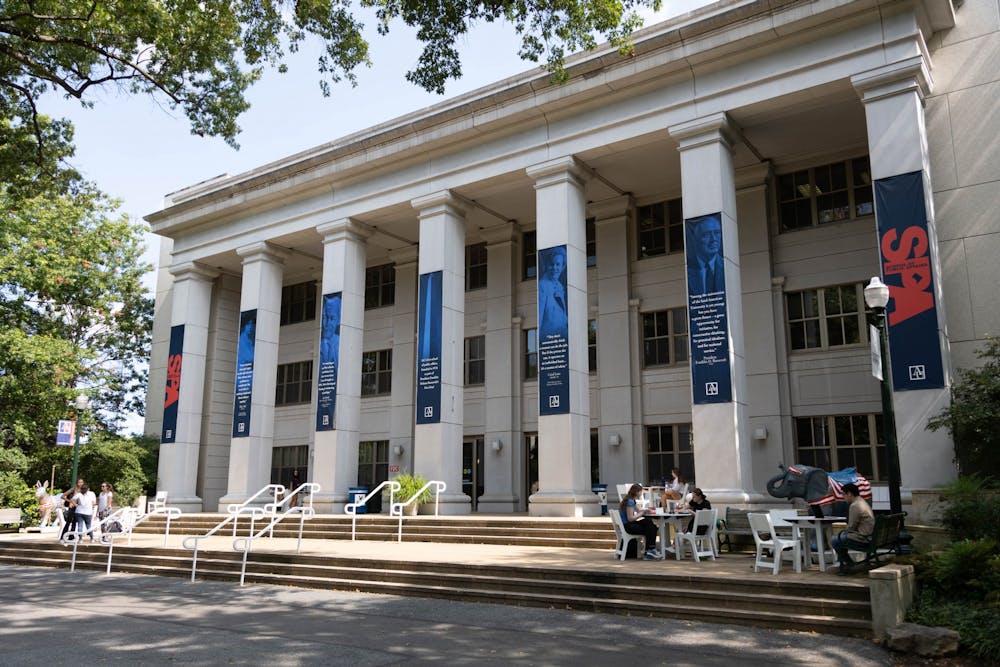A collaboration between students and faculty is currently underway to propose a center for the study of disability, advocacy and education in the American University School of Public Affairs. While the plan is in its early stages, those involved are excited about its potential.
Professor Rob Engel, who is co-leading the project with AU alumna Helena Berger and SPA adjunct professor Unice Lieberman, said one of the first indicators that AU needed a center for disability studies was the overwhelming number of AU undergraduate and graduate students who signed up for a summer course he was teaching on living with disability. Engel’s course, offered through an internship program with the American Association of People with Disabilities, was so popular he eventually had to add a second section.
“There’s a lot going on at the University when it comes to disability, but it’s scattered, it’s not unified. So you can find a course here or maybe a special session here or there doing something else related to disability,” said Berger, the chief operating officer at AAPD. “What I think the center can do is bring it together under one big umbrella, one big tent, and make it much more organized and focused.”
Engel is an adjunct professor in the Department of Government teaching courses on disability advocacy. As AU alumni and advocates for disability rights, Engel and Berger are working to create the center as a means of studying disability, advocacy and education.
“We’ve been going slow because we want to do this right,” Engel said. “We want to make sure that we put a big coalition together of not only people in the community, but our own students who are part of the program, so that we come to the table with strength.”
While the center has not yet been officially approved by the SPA, it has support from much of the school’s faculty.
“It’s been a long time since the Americans with Disabilities Act has been passed,” SPA Associate Dean for Undergraduate Education Saul Newman said. “I think it’s time to really focus on disability support and disability research in academia.”
The advisory board Engel and Berger created is researching and determining priorities and fundraising tactics for the center.
“We were really diligent when we put this advisory board together, including people, obviously, in the disability community,” Berger said. “I thought it was really important to get the student perspective.”
The board includes students from Engel’s summer course as well as members of the disabled community both on and off-campus.
Berger and Engel looked at the Disability Rights Law Clinic at the Washington College of Law, run by WCL professor and disability law expert Robert Dinnerstein, as one of the many strengths that AU brings to the table in terms of disability studies.
“We have some number of students who matriculate at the law school because we have a disability rights clinic,” Dinnerstein said. “They come to law school knowing they want to work in the disability rights area and they know that their chances of doing so are enhanced if they have been able to go into a school which has a clinic in that area.”
Although disability advocacy isn’t a main goal of the center, its existence would help to promote disability rights on campus, Berger said.
“AU is imperfect, like just about every other college and university out there,” Berger said. “So we realized this is sort of a two-fold project because if we’re going to have this center, and we want AU to sort of be a model, they also have to be sort of a model of accessibility as well.”
Funding is the most immediate challenge to the disability center and is the next task that the advisory board will have to face. Their goal is to create a vision for the center and then to stimulate interest and support for it on campus and elsewhere to garner the necessary financial support, Newman said.
Another challenge is that Engel and Berger both have full-time jobs, yet their work on the center is driven by their passion for it.
“We’re all committed to this, and you can see we’re passionate about it, but trying to make sure that we’re carving out the time that we need to keep the ball rolling,” Berger said. “Sometimes that’s hard when you’re doing this on a voluntary basis and you’ve got other commitments and you’ve got a job, so being perfectly honest and transparent I think that’s a bit of a challenge.”
Engel and Lieberman, along with some undergraduate students, will spend the summer researching what other centers for disability studies do around the country to determine what is successful and where the gaps are.
“I think that for the center, again, to be effective, it’s going to have to speak to people who may not always feel that they’re getting the kind of support services they need and I think, frankly, that administrators need to hear that,” Dinnerstein said. “The identity of having a disability is a very powerful identity.”





